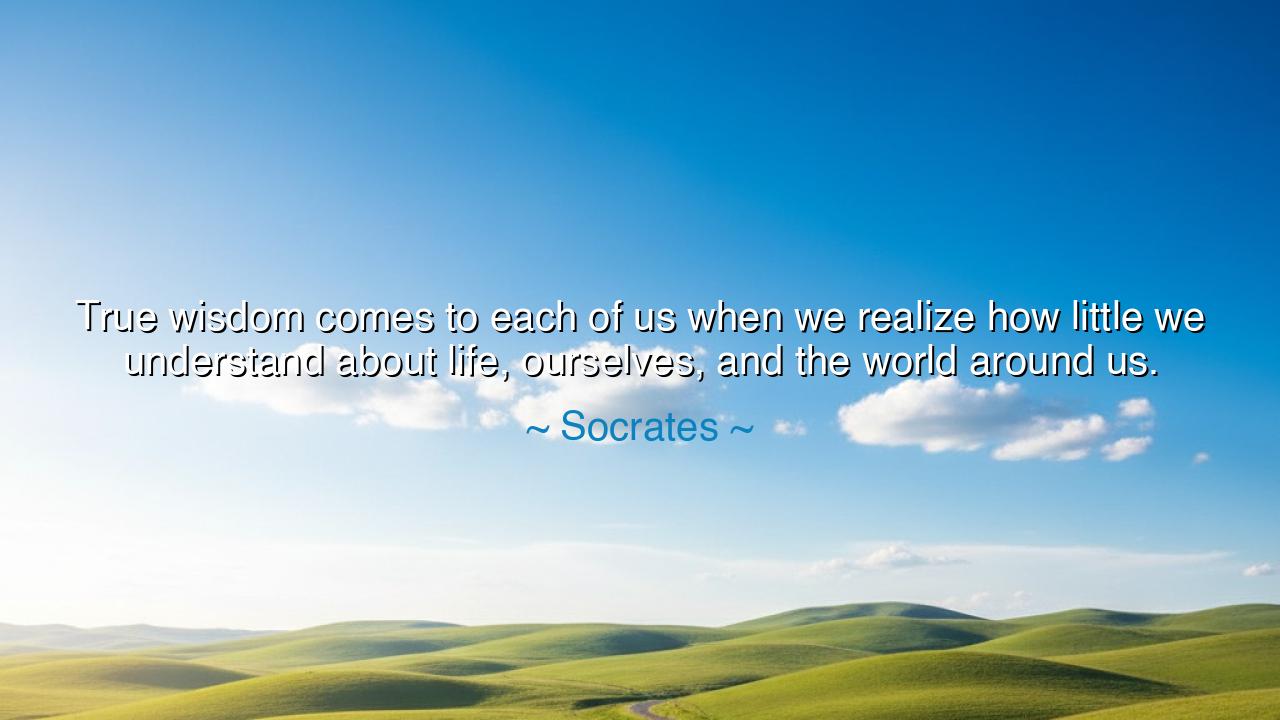
True wisdom comes to each of us when we realize how little we
True wisdom comes to each of us when we realize how little we understand about life, ourselves, and the world around us.






Socrates, the sage of Athens, whose words and life lit the path for all philosophy to follow, proclaimed: “True wisdom comes to each of us when we realize how little we understand about life, ourselves, and the world around us.” In this saying lies the essence of humility before truth, the acknowledgment that the human mind, vast though it may seem, is but a small lantern in an endless night. Socrates spoke not as one who claimed to know all, but as one who understood that ignorance is the beginning of wisdom.
The origin of this teaching comes from his trial, preserved in Plato’s Apology. When the Oracle at Delphi declared that none was wiser than Socrates, he sought to test the prophecy. He questioned politicians, poets, and craftsmen, each of whom thought himself wise. Yet Socrates found that while they claimed knowledge, they were blind to their own ignorance. Thus, he realized that his wisdom lay not in knowing much, but in knowing that he knew little. This paradox is the foundation of philosophy: that the door to wisdom opens only when pride is cast aside.
The meaning of his words is profound. To recognize how little we understand is to shed arrogance, to embrace humility, and to awaken curiosity. When we think we already know, we stop learning. But when we confess that we do not know, the soul becomes thirsty for truth, and learning becomes a lifelong journey. True wisdom is not a crown worn proudly, but a path walked humbly, always seeking, never ceasing.
History gives us a shining example in the life of Isaac Newton. After discovering the laws of motion and gravity, he declared that he felt like a child playing on the seashore, finding a smoother pebble or a prettier shell, while the great ocean of truth lay undiscovered before him. This echoes Socrates: even the greatest minds know that what they grasp is but a fragment of the whole. It is this humility that propelled Newton further, just as it propelled Socrates to question without end.
Socrates’ words also carry a warning. Those who believe they understand all—about life, themselves, or the world—become rigid, blind, and dangerous. History has been scarred by leaders who, convinced of their own perfect wisdom, refused to listen, to question, to doubt. Their certainty led to tyranny and ruin. But the leaders who admitted their limits, who sought counsel and questioned themselves, guided their people with justice. Here lies the power of Socratic humility: it guards us against the arrogance that destroys.
O children of tomorrow, hear this teaching: do not be ashamed to say, “I do not know.” For in those words lies the seed of greatness. Let curiosity be your constant companion, and humility your shield. Approach life as a student, not as a master. Question yourself, your world, your own heart, and you will find wisdom unfolding like a flower, petal by petal, across the seasons of your life.
The lesson is clear: wisdom begins with humility. In daily life, practice this by listening more than you speak, by asking questions rather than boasting answers, by treating every encounter as an opportunity to learn. Do not seek to appear wise—seek instead to be open, honest, and teachable. For the one who admits their ignorance is already wiser than the one who pretends to know.
Thus, let Socrates’ words endure across the ages: “True wisdom comes to each of us when we realize how little we understand.” Carry them in your heart, and you will never be trapped by pride. Instead, you will walk the endless road of learning, humble yet strong, seeking yet growing, and in that journey, you will taste the sweetness of wisdom that never fades.






AAdministratorAdministrator
Welcome, honored guests. Please leave a comment, we will respond soon